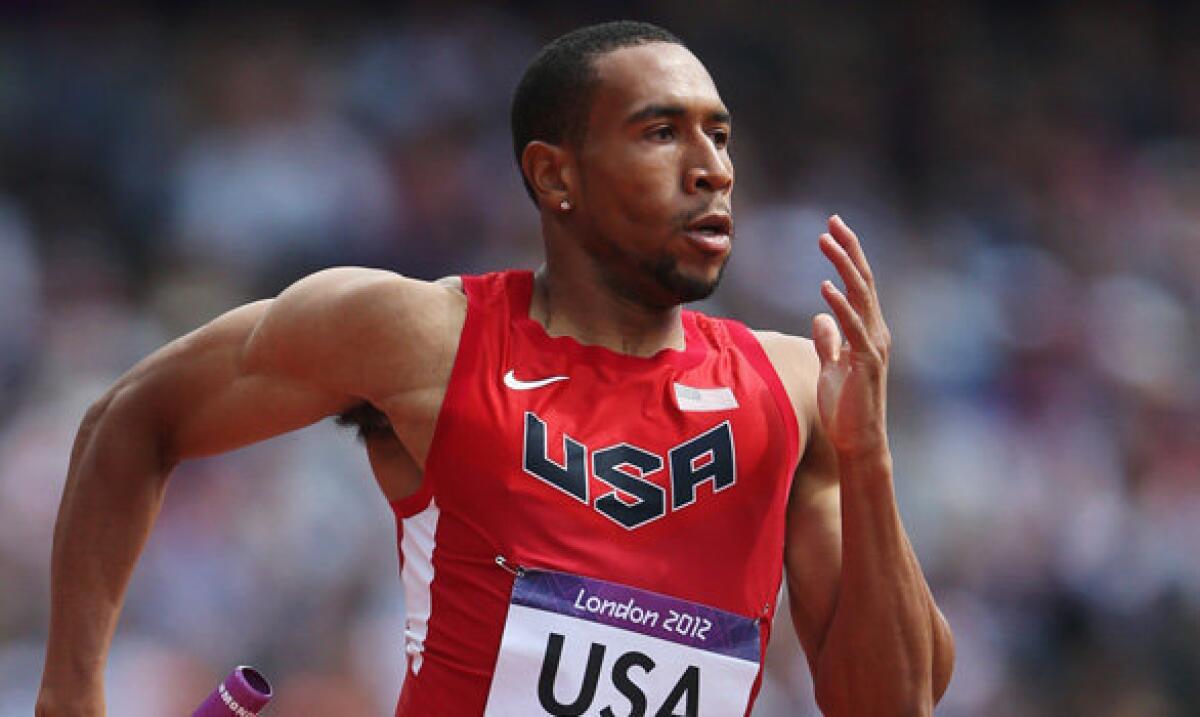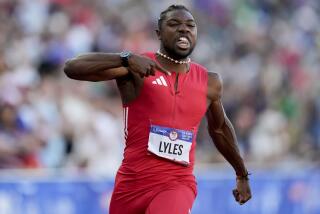A journey of healing for sprinter Bryshon Nellum

- Share via
LONDON — The scars are easy to ignore. They crisscross his legs, up above his knees, and Bryshon Nellum doesn’t let them bother him anymore.
The memories, those are tougher to shake.
The last few days, hanging around the Olympic village, waiting for his next race, Nellum has thought about that night in 2008 when two men gunned him down in the street outside a party.
PHOTOS: London Olympics, Day 13
The 23-year-old has ruminated about four agonizing years of recovery, the multiple surgeries and the afternoons when he lay crumpled on the track in pain, never knowing if he could regain his speed.
“It’s a blessing that I’m here,” he says. “I’m at the Olympics.”
Part of him doesn’t mind that he finished a step slow in a 400-meter semifinal this week, missing the final by a fraction of a second. He insists it’s all about the experience.
But another part of him knows there is one more chance — the 4x400-meter relay at Olympic Stadium on Friday, when he is scheduled to run the first leg for the U.S. team.
“I can get a medal,” he says. “That’s my dream.”
All he has to do is outrun the memories.
--
It was early in his sophomore year at USC when the track coaches asked Nellum to show a recruit a good time. The teenagers went to a party just off-campus, leaving after midnight.
“I remember everything that happened,” Nellum said. “The two guys were on my left side. I was walking across the street and they got me on my blind side.”
Shotgun blasts rang in his ears and he felt something strange in both legs. Nellum knew that he had been shot but did not want to believe it, reaching down to check.
Police later arrested two gang members who they believe mistook Nellum for a rival. Last August, the two pleaded no contest to one count each of attempted murder and were sentenced to 15 years in state prison.
“The recruit?” Nellum said, shaking his head. “He didn’t come to ‘SC.”
Twice over the next year, doctors performed surgery to remove the pellets. No one could be sure if this kid — who had ranked among the top high school sprinters in the nation at Long Beach Poly — would ever race again.
“All of us go through periods where we have doubt or question,” said Ron Allice, the USC track coach. “Every time he had a surgery, it was like starting from scratch.”
Through months of pain and weakness, Nellum considered quitting. But he had something more than youth on his side.
“He has always been such a positive individual,” his mother, LeShon Hughes, said. “Even when he had this tragedy, his attitude never changed.”
There was also a dose of curiosity, Nellum wondering if he could regain the thrill he used to feel when he ran hard in high school.
In the spring of 2010, on his birthday, he asked Allice if he could run in a dual meet against UCLA. “I caved in and told him that he could go,” the coach recalled.
Though not particularly fast, his time was good enough for second place in the 400. It was a turning point, a hint of things to come.
But there was still something wrong, a pain that would not go away.
--
A few pellets remained inside him, lodged in the soft tissue. Every time he ran, every time his muscles contracted, the fragments shifted around. And if they happened to bump against a nerve ending, Nellum went down in a heap.
Doctors weren’t thrilled with the idea of a third surgery. If something went wrong, he could suffer nerve damage or even be paralyzed.
“It was scary,” his mother recalled. “But he told me, ‘Mom, I want to do it.’”
The gamble paid off. When the swelling subsided, when Nellum got back on the track last fall, his muscles felt looser, almost like before the shooting.
This spring, he and Allice embarked on a cautious path, refusing to set any goals. With each new day, they gauged Nellum’s fitness, deciding on what to try next.
The redshirt senior ran his first 400 of the season at just under 47 seconds, then shaved a few tenths off his next start. At the Mt. SAC Relays in April, he blazed to a 45.18 finish.
Crossing the line, he didn’t bother to look at the clock.
“I could tell it was a personal best,” he said. “That feeling, it was nice. I hadn’t felt like that in four years.”
Though encouraged, Allice knew his runner had only scratched the surface. He could see that Nellum still wasn’t running hard on the turns.
That is where a 400 runner’s legs take the most stress, especially on the final curve where he must build momentum and slingshot himself down the homestretch.
Even when Nellum lowered that personal record to 44.80 at the U.S. trials in June, even when he out-leaned USC teammate Josh Mance to finish third and make the Olympic team, his coach could see room for improvement.
“He’s being conservative based on the scar tissue in his legs,” Allice said. “That part of his racing will change, based on his confidence.”
--
The nightmares, the ones where strangers chase him down, have grown less frequent over the last year or so.
Still, Nellum said, “I’ll never forget. That night always crosses my mind.”
Which might explain — in part — his performance in the 400 semifinal on Sunday. Going out fast, Nellum could afford to relax down the backstretch. But when the leaders turned on the jets coming around the final turn, he could not keep pace.
“I was behind,” he said. “I had to play catch-up.”
Given another chance in the first round of the relay on Thursday, he looked more assured.
The U.S. had to come from behind after leadoff runner Manteo Mitchell fractured his fibula midway through the first lap and hobbled the rest of the way.
Nellum took the baton for the anchor leg in second place and chased down a runner from the Bahamas, easing up at the end, giving the U.S. a tie for the fastest time heading into Friday’s final.
Watching from the stands, his mother could barely contain herself.
“I started laughing in my heart; my whole body was weird,” she said. “That’s my son out there. I wanted to cry for joy.”
Even with a thin roster of 400-meter runners, the Americans are expected to earn a spot on the podium. Especially with the Jamaican team failing to finish their semifinal because of injury.
Nellum would love to have some hardware draped around his neck on Friday, the perfect ending to his dream scenario. But he has another motive for racing.
“The more I run,” he said, “the more I put the negativity behind.”
And an Olympic medal, he figures, would create an entirely different type of memory.
twitter.com/LATimesWhartonMore to Read
Go beyond the scoreboard
Get the latest on L.A.'s teams in the daily Sports Report newsletter.
You may occasionally receive promotional content from the Los Angeles Times.











